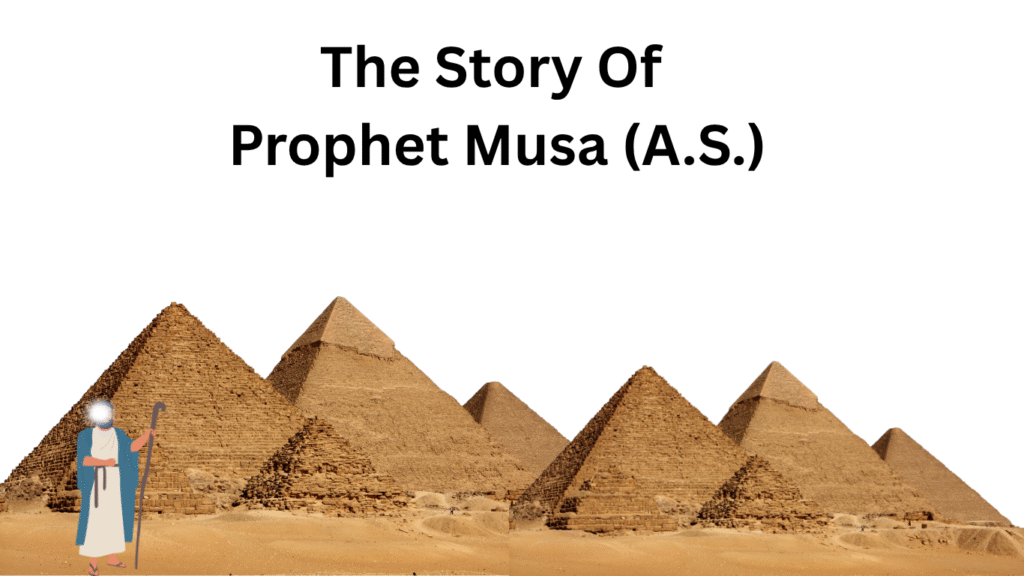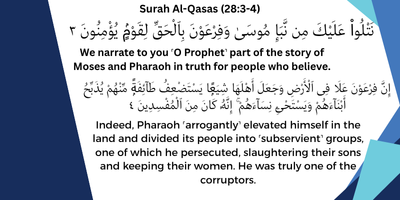The Story of Prophet Musa (A.S.)

Introduction
Among the most remarkable stories in the Qur’an, the story of Prophet Musa A.S. stands as a timeless testament to faith, resilience, and trust in Allah’s divine plan. I’ve always been captivated by this narrative because it reflects not just the life of a prophet but also the struggles, triumphs, and guidance that shape human character.
From his miraculous survival as an infant to his leadership of the Israelites and encounters with Pharaoh, the story of Prophet Musa A.S. offers lessons in patience, steadfastness, and unwavering devotion to Allah. Today, I want to take you on a journey through his life, drawing insights that remain deeply relevant in our contemporary world.
The Birth and Early Life of Prophet Musa A.S.

The story begins in Egypt, a land under the tyrannical rule of Pharaoh, who feared the growing number of Israelites. The Qur’an narrates in Surah Al-Qasas (28:3-4) how Pharaoh sought to suppress the Israelites by ordering the killing of newborn male children.
Even in such dire circumstances, Allah’s protection over His chosen servants manifested. Musa’s mother, following divine guidance, placed him in a basket and set him afloat on the Nile. This act of trust and submission embodies a profound lesson: faith in Allah often requires courage in moments of uncertainty.
Pharaoh’s household discovered the basket, and Musa was raised under the protection of the very ruler who had sought his life. Allah’s plan ensured Musa’s upbringing in a setting that would prepare him for his monumental mission.
Youth and the Flight from Egypt
As Musa grew, he became aware of injustice around him. An incident where he defended a fellow Israelite and unintentionally killed an Egyptian changed the trajectory of his life. Surah Al-Qasas (28:15-16) highlights Musa’s realization of the consequences of his action, leading to his flight to Midian.
This part of Musa’s story reflects the human struggle of navigating moral responsibility. Mistakes, even with good intentions, have consequences but Allah’s guidance continues for those who turn toward righteousness.
In Midian, Musa helped the daughters of Prophet Shuayb A.S., demonstrating kindness, humility, and a willingness to serve. This period of his life reminds me how formative experiences and patient endurance prepare one for greater responsibilities.
Divine Encounter: The Burning Bush
The most transformative moment in Musa’s life came on Mount Sinai, where he encountered Allah in the form of a burning bush. Surah Ta-Ha (20:9-12) narrates Allah calling Musa, commanding him to lead the Israelites out of Egypt.
Musa initially hesitated, questioning his own abilities and expressing concern about his speech. The Qur’an teaches that even the most chosen servants may doubt themselves, but trust in Allah’s wisdom transforms limitations into strengths.
Allah appointed his brother Harun A.S. as his assistant, emphasizing the importance of collaboration, support, and humility in fulfilling divine missions.
Confrontation with Pharaoh
Prophet Musa’s confrontation with Pharaoh is one of the most dramatic episodes in Qur’anic history. Pharaoh, blinded by arrogance, rejected Musa’s message, resulting in a series of divine signs (Ayat) that displayed Allah’s supreme authority.
From the staff turning into a serpent to the plagues and miraculous events, each moment reflects Allah’s wisdom and the necessity of patience in the face of oppression. Surah Al-A’raf (7:103-137) narrates these encounters, showcasing Musa’s resilience and steadfastness.
This story emphasizes the challenge of speaking truth to power. Musa’s unwavering commitment to Allah’s command inspires courage when confronting injustice today.
The Exodus and Parting of the Sea
The miraculous parting of the Red Sea is perhaps the most iconic episode in Musa’s story. Pursued by Pharaoh’s army, Musa’s faith and Allah’s divine intervention delivered the Israelites to safety. Surah Ash-Shu’ara (26:63-66) describes how the waters divided, allowing passage and engulfing the tyrants.
This event demonstrates the power of reliance on Allah during seemingly impossible circumstances. Challenges that appear insurmountable may, in reality, be opportunities for divine miracles.
The Ten Commandments and Prophetic Mission
Following the exodus, Musa A.S. ascended Mount Sinai to receive guidance and the Torah. This phase emphasizes the importance of divine law, ethical conduct, and spiritual responsibility. Surah Al-Baqarah (2:53) highlights Allah providing clear guidance to ensure justice and moral integrity among the Israelites.
Musa’s story teaches that leadership and responsibility extend beyond immediate actions they require a framework of principles, patience, and continual trust in Allah.
Trials in the Wilderness
Despite miraculous deliverance, the Israelites struggled with impatience, doubt, and disobedience. Musa’s role as a leader was continuously tested. Surah Al-A’raf (7:138-141) recounts the golden calf incident, highlighting the fragility of human faith.
Even the most devoted communities face challenges, but steady guidance, patience, and reliance on Allah can restore moral and spiritual balance.
Lessons from Prophet Musa’s Character
Throughout his life, Prophet Musa A.S. exhibited exceptional qualities:
Faith and Trust in Allah: Unwavering belief in Allah’s plan even during perilous moments.
Patience in Adversity: From infancy to confronting Pharaoh, Musa’s patience was remarkable.
Leadership and Justice: Led with integrity, fairness, and moral courage.
Humility and Dependence on Allah: Remained humble, acknowledging Allah’s supremacy in every success.
These traits offer timeless guidance for personal, social, and spiritual development.
Comparative Religious Perspective
Musa’s story appears across Islamic, Christian, and Jewish traditions. While details vary, overarching themes of faith, liberation, and divine guidance remain consistent. Surah Al-Qasas (28:3-5) and the Torah provide complementary insights.
These parallels highlight shared heritage and values across Abrahamic faiths, emphasizing morality, justice, and reliance on God.
Modern Applications
Musa’s story provides guidance for contemporary challenges:
Facing oppression with courage
Maintaining ethical leadership
Trusting divine guidance in uncertainty
Encouraging patience and resilience in communities
Whether navigating personal trials or societal injustices, the lessons from Musa’s life remain profoundly relevant.
Conclusion
The story of Prophet Musa A.S. is a timeless testament to faith, patience, and divine guidance. From his miraculous survival as an infant to his leadership of the Israelites and the confrontation with Pharaoh, Musa’s life teaches us the importance of trusting Allah, standing for justice, and remaining steadfast in the face of adversity.
Reflecting on his journey, I am personally inspired by his unwavering courage and humility. His story reminds us that challenges, no matter how insurmountable they seem, can be overcome with faith, perseverance, and reliance on Allah’s wisdom.
By studying Prophet Musa A.S.’s life, we gain insights that remain relevant today,whether in our personal struggles, leadership roles, or moral responsibilities. His legacy encourages us to live with integrity, patience, and devotion, demonstrating that true guidance comes from aligning our actions with divine principles.
Ultimately, the story of Prophet Musa A.S. is more than a historical narrative,it is a source of guidance, inspiration, and hope for every believer striving to navigate life’s challenges with faith and resilience.
Recommended: Prophet Dhu al-Kifl (A.S.)
FAQs About The Story of Prophet Musa A.S.
Who was Prophet Musa A.S.?
Prophet Musa A.S. was a prophet chosen to lead the Israelites out of Pharaoh’s oppression.What are the key miracles of Prophet Musa?
His miracles include the staff turning into a serpent, plagues sent to Egypt, and the parting of the Red Sea.Why did Allah choose Musa to confront Pharaoh?
Because of his steadfast faith, patience, and ability to lead the Israelites with justice.How did Musa A.S. demonstrate patience?
Through his infancy, exile in Midian, confronting Pharaoh, and guiding the Israelites in the wilderness.What lessons does Musa’s confrontation with Pharaoh teach?
Courage, reliance on Allah, and standing for truth against tyranny.How did Allah protect Musa as an infant?
Musa was placed in a basket on the Nile; Allah ensured his safety and upbringing in Pharaoh’s household.What role did Harun A.S. play?
He assisted Musa in conveying Allah’s message and supporting the Israelites.What is the significance of the Ten Commandments?
They provided moral guidance and a framework for justice.How is Musa’s story relevant today?
It teaches resilience, ethical leadership, patience, and trust in divine guidance.Where can I read more about Prophet Musa A.S.?
Explore Surah Al-Qasas (28), Surah Ta-Ha (20), and Surah Ash-Shu’ara (26).